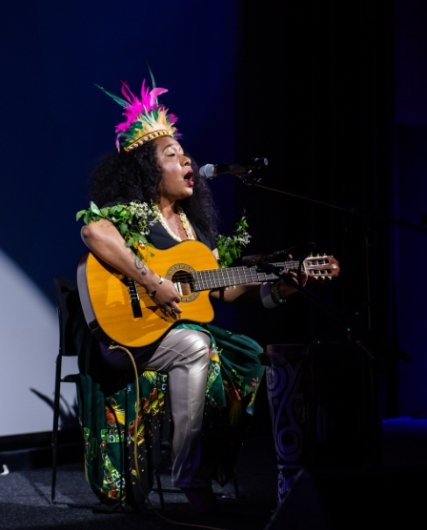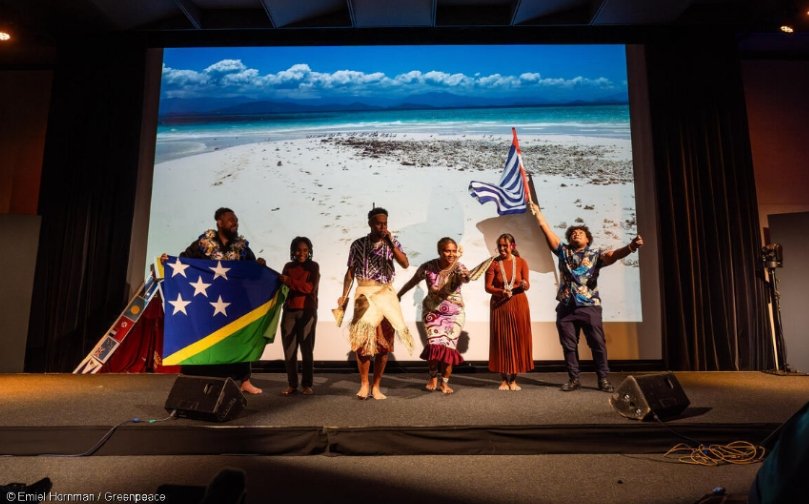Marking a Historic Moment - Opening Ceremony for the ICJAO oral hearings
© Interactive Media Foundation.
The Opening Ceremony for the International Court of Justice Advisory Opinion (ICJAO) hearings ceremoniously opened the hearings in a festive manner, centering community, collective joy, and the start of the pinnacle of the ICJAO journey to the World’s Highest Court. This gathering brought together a diverse array of voices, cultural traditions, and collective action to pave the way for impactful advocacy work during the oral hearings of the ICJAO on Climate Change and Human Rights.
A Warm Welcome through cultural unity
The event began with a heartfelt and warm welcome to all attendees from moderators Noemi Zenk-Agyei (WYCJ) and Belyndar Rikimani (PISFCC). A traditional Kava Ceremony followed. A kava ceremony is a traditional cultural ritual practiced throughout the Pacific. It involves the preparation and sharing of kava, a drink made from the root of the kava plant. The ceremony often serves a social, spiritual, or diplomatic purpose. By sharing this drink participants foster community, respect, and connection. All speakers were invited on stage to drink a bowl of Kava. This cultural opening was a powerful reminder of the deep connections between Indigenous traditions and environmental stewardship.
Keynote contributions: Urgency, Action and Tradition
Keynote speakers and artists underscored the critical realities of the climate crisis and the need for immediate, unified action. Between the first and second acts of the opening ceremony, the audience is taken on a journey to Fiji. Dylan Kava shared his personal message to the judges of the ICJ. His message was part of the witness stand videos that WYCJ and PISFCC created with media partner Interactive Media Foundation to increase the participation of witnesses worldwide in this historic climate justice proceedings. Dylan made vividly clear in his testimony what true Pacific resilience entails:
‘As a Pacific climate warrior, I stand firm in the mindset that we are not drowning. We are fighting, fighting for our homes, our heritage, and our humanity.’.
Dylan's testimony set the tone for the afternoon and reminded the audience of the importance of the coming weeks.
After Dylan’s moving words, Vishal Prasad, campaign director of the PISFCC, took the stage and welcomed the visitors to The Hague. Vishal shared insights about the importance of these historic hearings and the long journey to get to this point. His call to action highlighted the importance of love, courage and knowledge to push for a future we collectively deserve. Vishal also mentioned the aim of including those who will not have the chance to appear in person before the court. After Vishal’s welcoming words, Honourable Ralph Regenvanu, the Special Envoy for Climate Change and Environment for Vanuatu, took the stage and provided a warm Pacific welcome to all attendees. He highlighted how important it is to merge collective interests and how collaborative efforts between the youth and governments brought the world together in The Hague. Honourable Ralph reflected in his statement upon the long and difficult journey it took to come to The Hague:
‘This journey to The Hague has been extraordinary, not only for its historic significance, but also for its collaborative approach that brought us all here together. Governments and youth have united to amplify a single powerful call for justice. This collaboration underscores the essence of this historic movement. When we come together to merge our vision and efforts, transformative change is possible.’
The powerful words of the Honorable Ralph Regenvanu were followed by Raki Ap, international spokesperson of the United Liberation Movement for West Papua. Raki explained the role that colonialism played and still plays as a driving factor behind the climate crisis. He continued to explain how the struggle for self-determination of the people of West Papua is intertwined with the struggle for climate justice. The struggle for West Papua's self-determination is deeply connected to climate justice because, as Raki highlights, the exploitation of West Papua’s rich natural resources, including its forests and minerals, fuels environmental destruction for the sake of profits for multinational corporations. At the same time, Indigenous Peoples who are key stewards of the land are forcefully being displaced. Protecting West Papua’s sovereignty is therefore crucial to safeguarding its ecosystems and upholding Indigenous rights in the fight against climate change. This moving speech given by Raki encompassed the resilience and aspirations of the people of West Papua. After Raki’s speech, the audience was taken on a musical journey by Vinolia Koerni. She both played and sang traditional music from West Papua and beautifully embodied the fighting spirit of the people of West Papua.
© Interactive Media Foundation.
The fight for climate justice is a global one, a fight that is not only being fought in the Pacific by young people. This became clearer once more when Pia Hollenstein took the stage to share her story from Switzerland. Pia Hollenstein is part of KlimaSeniorinnen, the group that sued the government of Switzerland for insufficient action to protect the rights of elderly women from the effects of the climate crisis. Ms Hollenstein’s presentation was insightful and embodied the intergenerational approach desperately needed in the climate discourse.
After Ms. Hollenstein’s important presentation, the stage was set for Zaire Krieger. Zaire Krieger is a poet, writer, and spoken word artist. She weaved together the topics of identity, social equity and environmental urgency in the context of the climate crisis and the ICJAO. Her poetry was both inspiring and touching. Zaire made it clear that sometimes we feel disconnected from the activist voices that burn deeply inside of us. We often forget what it means to be part of a movement that seeks to change the world. Zaire embodied this beautifully by reciting from her own work:
‘You forget that history will be kind to you, even your one drop is a step to aspire to, just as you aspire to the ones before you. Every word laid down is a flow of someone's activism. Every curve in this river is a sum of the meandering power of every speech, every report of every commission.’
This notion of inspiration through storytelling is carried through in the keynote of Kjelld Kroon. Kjelld is a climate justice activist from Bonaire, which is part of the Kingdom of the Netherlands. In his intervention, Kjelld explained the symbiotic relationship that his people have with the sea and the land. He continued to explain that this special bond is being threatened at the cost of his people due to the climate crisis. The rise in sea level is directly threatening the people on Bonaire. This threat is so severe that Kjelld and a group of people from Bonaire decided it was time to sue the Dutch Government for failing to protect the people living on Bonaire. Both the Bonaire case and the ICJAO highlight the shared responsibility of governments to prioritize the rights and protection of vulnerable communities, emphasizing that achieving climate justice requires addressing both systemic neglect and environmental exploitation. Even though it's a different court and a different climate case, both outcomes are ultimately intertwined.
The Pacific in The Hague
Visitors were treated to two beautiful performances from the Pacific. The first one was provided by John Taukave. The latter by musical duo Khazin and Camilla, they brought the Pacific to The Hague and filled the room with warmth thanks to their wonderful cultural renditions of songs accompanied by dances that represent and celebrate Indigenous Pacific culture. The audience was invited to join and dance on stage with the performers; a true warm Pacific fest was put on display for the world to see. The evening concluded with reflections and a memorable performance by the Honourable Teburoro Tito, Kiribati's ambassador to the UN and former president. His words and songs underscored the transformative potential of unity in addressing the climate crisis. He reflected on his many years of experience in the field of international diplomacy. He said how he has seen many efforts come and go, but never saw anything like this. The way in which the youth and the government of Vanuatu worked together and manifested itself into the adoption of a resolution by consensus. He called it magic, the way in which this historical achievement was made possible by a Pacific island state.
Before the event transitioned into a reception, Jule Schnakenberg (WYCJ) took the stage and formally closed the event. She thanked all speakers, performers, volunteers, and people who traveled from all over the world to attend these historic hearings in The Hague and explained what these next two weeks would look like.
This opening ceremony set the stage for a transformative chapter in the much-needed fight for climate justice. By amplifying the voices of frontline communities and fostering global solidarity, the outcome of the ICJAO hearings has the potential to be a turning point in our collective efforts to safeguard the rights of present and future generations. Over the two weeks that followed, the spirit of solidarity and culture presented in the opening ceremony carried through every discussion, debate, and collaboration. Many who had worked together remotely for years finally came together in person, tirelessly dedicating themselves to the same values of unity, equity, and justice highlighted in the ceremony. This collective commitment showcased the importance of community, culture, and shared vision in driving the ICJAO hearings forward. We are optimistic about what the ICJ will have to say.
AO let’s go!



